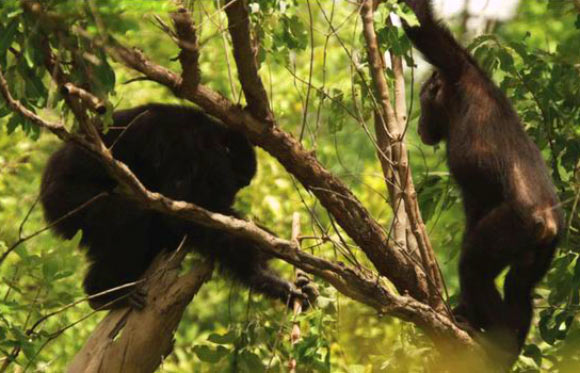According to a team of scientists headed by Dr Jill Pruetz of Iowa State University, female West African chimpanzees (Pan troglodytes ssp. verus) hunt with tools more than males.

Adult male West African chimpanzee uses tree branch with modified end to stab into a cavity within a hollow tree branch that houses a Senegal bush baby he ultimately captures as his adolescent brother looks on. Image credit: J. D. Pruetz et al / Royal Society Open Science / BBC.
West African chimpanzees at Fongoli, southeastern Sénégal, are the only non-human population to consistently hunt prey with tools.
“Why is that the case? A better question may be why are chimps at other sites not using this technique? It may be that they never learned the technique. Tool hunting also may be a result of social tolerance that doesn’t exist at other chimp sites,” said Dr Pruetz, the first author of the paper published in the journal Royal Society Open Science.
Dr Pruetz and her colleagues from the UK, Germany, and the United States, observed both male and female Fongoli chimpanzees using tools, but more than half of the hunts – 175 compared to 130 – were by females.
While males made up about 60% of the hunting group, only 40% of the hunts were by males.
“It’s just another example of diversity in chimp behavior that we keep finding the longer we study wild chimps,” Pruetz said.
“It is more the exception than the rule that you’ll find some sort of different behavior, even though we’ve studied chimps extensively.”
Both male and female chimpanzees primarily Senegal bush babies (Galago senegalensis) in tool-assisted hunts. Dr Pruetz said the chimpanzees used a spear-like tool to jab at the animal hiding in tree cavities.
“One explanation for the sex difference in tool use is that male chimps tended to be more opportunistic,” Dr Pruetz said.
“What would often happen is the male would be in the vicinity of another individual hunting with a tool, often a female, and the bush baby was able to escape the female and the male grabbed the bush baby as it fled.”
_____
J. D. Pruetz et al. New evidence on the tool-assisted hunting exhibited by chimpanzees (Pan troglodytes verus) in a savannah habitat at Fongoli, Sénégal. Royal Society Open Science, published online April 15, 2015; doi: 10.1098/rsos.140507







